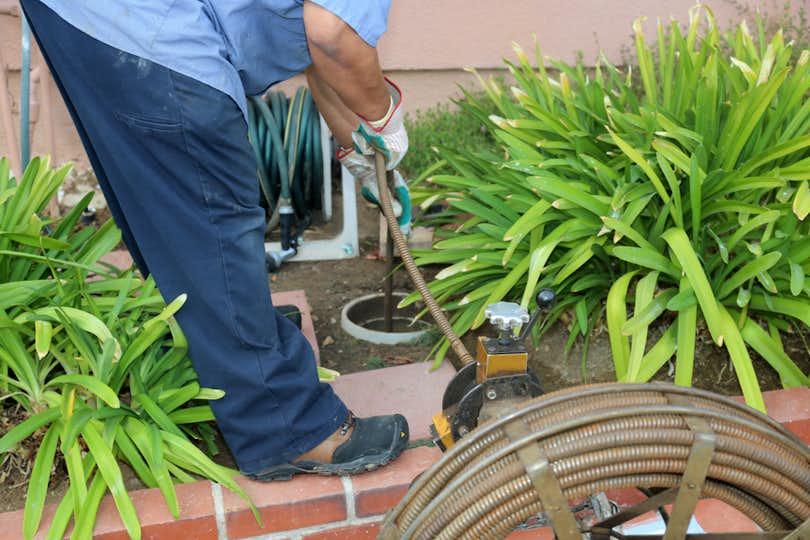Do I need a sewer line inspection? | What happens during a sewer line inspection? | Who do I call for a sewer line inspection? | How much do sewer line repairs cost? | Can I DIY a sewer inspection to save money? | Sewer line maintenance tips

A sewer inspection costs between $237 and $1,051, with an average price of $644 in the United States.[1] The cost of a sewer inspection varies based on the accessibility of the cleanout valve.
Although most plumbers charge by the hour, a sewer line inspection is generally offered for a flat fee. Some plumbers will give a free sewer line inspection with a routine sewer line cleanout.
Do I need a sewer line inspection?
Experts recommend a sewer inspection when buying a home if:
- The house is more than 20 years old
- The house has large trees in the front yard
- The cleanout cap looks new compared to the valve (indication of a recent sewer line problem)
- The previous owner has disclosed plumbing issues
- Your general home inspector has flagged the need for one
A knowledgeable realtor can help you determine whether a property in which you're interested requires a sewer inspection.
>> Looking for a trusted local real estate agent? Connect with Clever!
It's also a good idea to have your sewer line inspected if you plan to add a bathroom to your home or to remodel your kitchen or bathroom. An inspection can confirm whether or not your sewer line can accommodate new appliances and a potentially increased volume of wastewater.
Outside of a home purchase or construction work, a sewer inspection isn't usually performed unless you are experiencing specific plumbing concerns. These can include:
- Sewage backing up into your sinks, toilets, or bathtubs
- Gurgling sounds coming from your pipes
- Water backing up into your shower or bathtub when the washing machine is in use
- Recurring plumbing clogs or multiple drains clogging simultaneously
- Slow drains
- Sewer-like odors within the home
- Water stains or signs of excess moisture around your home's foundation
- Water pooling around the floor drain in your basement
🛁 What is a sewer line?
Your sewer line is the pipe that channels all of the wastewater from your toilets, tubs, showers, and sinks out of your home towards the main sewer line. This is usually located under the street in front of your home, and leads to a local wastewater treatment plant.
Your sewer line is not the same as your water line. Your water line is the pipe that supplies clean pressurized water to your home from the public water supply.
Prior to the early 1980s, many homes were constructed with clay sewer pipes that are easily broken or crushed. Now, sewer pipes are replaced with more durable PVC piping when required.
Although copper piping is used to replace older water lines, it's not used for sewer lines because the acidity of wastewater will cause it to corrode.
What happens during a sewer line inspection?
Plumbers use a small camera attached to a long cable to inspect the inside of a sewer line. They snake the camera through the pipe to identify the location and cause of clogs or damage.
First, your plumber opens the cleanout cap to run the camera through the line. As a homeowner, it's always good to know the location of your sewer cleanout valves.
Typically, cleanout valves are under the house below major plumbing fixtures. The main cleanout is usually outside against an external wall. In regions with a colder climate, the main cleanout may be built into the basement floor.
Once the camera is in the pipe, the inspector uses it to do a visual check for clogs, damage, or invasive tree roots.
When the inspection is complete, the inspector removes the camera and caps the valve. Afterwards, they provide a report illuminating the results. Sometimes, this is accompanied by a DVD or digital file of the camera footage.
Locating the obstruction or damage via camera makes it much simpler to repair the issue. It prevents you from having to dig up your yard in multiple places to pinpoint the problem. And it's far less expensive than excavating the entire sewer line.
Who do I call for a sewer line inspection?
Plumbing companies and sewer contractors perform sewer inspections. It's best to work with licensed professionals for all home inspections.
Plumbing license requirements vary by state. A number of organizations like the National Association of Sewer Service Companies and the International Association of Certified Home Inspectors offer education and certification.
How do I find a reputable sewer inspector?
If you need a plumbing inspection in the context of a home sale, your real estate agent and general home inspector should be able to provide referrals to professionals with whom they've worked in the past.
Friends and neighbors are also good sources of recommendations, as are online review sites like HomeAdvisor and the Better Business Bureau.
How much do sewer line repairs cost?
| Sewer repair service | Average cost[1] |
|---|---|
| General plumbing services | $45-150/hour |
| Drain clearing | $200 |
| Sewer line clearing | $300 |
| Sewer line repair | $2,500 |
| Sewer line replacement | $7,500 |
Plumbers generally work for a rate of $45-150 per hour.
Cleaning out a specific drain in your home costs an average of $200. This occurs when a clog is located in the pipe that connects a fixture like a sink or toilet to the sewer line.
A sewer line cleanout is a bit more complicated, costing an average of $300. This service clears a clog in the line that connects your home to the public sewer.
Repairing your sewer line costs an average of $2,500. This involves fixing a particular section that's damaged or is experiencing tree root intrusion.
Replacing the sewer line in its entirety can potentially be the most expensive repair a homeowner will experience. Excavating the existing pipe and replacing it with a new one costs an average of $7,500.
All plumbing prices may vary depending on cleanout accessibility, the severity of the clog, and labor costs.
Occasionally, plumbers may offer free inspections and then mark up their repair prices. To avoid this conflict of interest, request all pricing upfront or use different companies for inspection and repair.
💸 Does my homeowner's insurance or home warranty cover my sewer line?
No, issues with your sewer line are not usually covered by insurance because the sewer line is outside of the physical home structure.
A standard policy won’t automatically cover the utility lines that connect to your house unless you’ve specifically added coverage.
Because of this, it’s especially critical for homeowners to maintain their sewer lines and work to prevent problems before they occur.
Can I DIY a sewer inspection to save money?
You can rent equipment to inspect and clear your sewer line at most home improvement stores. But make sure you study up and know what you're doing so you don't cause more damage and exacerbate issues.
The cost to rent a drain camera is about $200 a day. It may cost more or less depending on the length of cable you need.
The cost to rent a large drain cleaner is less than $100 a day.
It may not be much more expensive to hire a professional to efficiently inspect your sewer line and provide knowledgeable recommendations for repair and maintenance.
Sewer line maintenance tips
Certain sewer line problems may be inevitable, but there are some steps you can take to help avoid common challenges.
Trim back tree roots: Tree root intrusion is the top cause of sewer line issues.
Limit the food waste that goes down the drain: Eggshells and coffee grounds are particularly clog-prone.
Don't pour cooking grease down the drain: Even if it goes down with hot water, the grease will cool and coagulate somewhere in your sewer line.
Don't put bulky items down the drain, even if they're labeled "flushable": Avoid clogs by putting baby wipes, paper towels, and feminine sanitary products in the trash bin. Make sure small items like produce stickers, rubber bands, and soda pull tabs also go in the garbage rather than down the drain.
Set toilets to high-volume flush: This will help push the water through and avoid blockages.
Use natural drain cleaning products: Some drain cleaners will help break down lodged materials without the use of harsh chemicals that can damage pipes.
Have your sewer cleaned and inspected regularly: Industry experts recommend an annual inspection and cleaning to prevent clogs and preemptively pinpoint potential issues like bellied or broken pipes.
